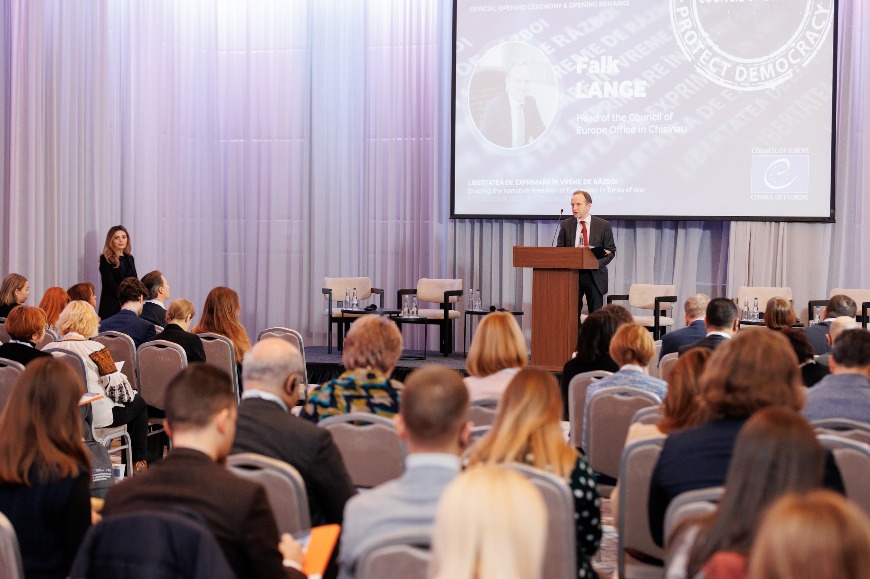Freedom of expression, the evolution of the phenomenon in the context of Russian aggression in Ukraine, as well as the documents that guarantee and regulate the observance of this right were among the most important topics of discussion at the Council of Europe Regional Forum “Freedom of expression in times of war”, held in Chisinau.
The second edition of the event gathered approximately 100 participants, including local and international experts, authorities, and media representatives from Eastern Partnership (EaP) countries: Armenia, Azerbaijan, Georgia, the Republic of Moldova, and Ukraine. This Council of Europe initiative serves as a significant platform for analyzing issues related to ongoing reforms addressing wartime challenges, combating information clutter and disinformation, but also protecting journalists and other media actors.
"In the last two years, Moldova has faced multiple challenges - security, humanitarian, economic, and energy threats. These, in turn, have inevitably perpetuated the existing vulnerabilities in the media sector. However, we observe that amidst these uncertain times, Moldova's resilience is growing in the face of these multiple challenges. With the unwavering support of the international community, Moldova is making progress in addressing its commitments. In the last year, the country has adopted new legislation that includes provisions to prevent the concentration of media ownership and to ensure transparency in this field,” stated Hanne JUNCHER, Director, Information Society and Action Against Crime Directorate, Council of Europe.
"It is difficult to talk about freedom of expression during wartime, and I believe that for our countries, even in times of peace, freedom of expression is an area that needs improvement. It is complicated not just for state bodies or international organizations that need to promote standards, but especially for journalists, press organizations, and civil society organizations working in the media field. Because none of us were prepared to work under war conditions.", said Liliana NICOLĂESCU-ONOFREI, President of the Parliamentary Commission for Culture, Education, Research, Youth, Sports, and Media.
The Council of Europe Regional Forum “Freedom of Expression in Times of War” followed a significant development earlier in the year, where heads of state and government from the Council’s 46 member countries raised concerns about democratic regression. In response, they adopted “The Reykjavik Principles for Democracy”. This document underscores the urgent need for new standards to safeguard human rights in the digital era, particularly in the context of artificial intelligence’s rapid development.
The Register of damages caused by the Russian Federation’s war of aggression against Ukraine was also created as a first step towards an international compensation mechanism, as the Ukrainian infrastructure and media market have been severely damaged.
"We are witnessing times when press freedom is overshadowed by regional conflicts, with substantial vulnerabilities that still need to be addressed. There have also been attempts to ensure a delicate balance between state security through active measures to counteract disinformation and protecting media freedom. In the case of Moldova, issues such as media polarization, political control of the press, gaps in enforcement mechanisms for identifying final beneficiaries and owners of media outlets, the rise of information disorder and threats, hate speech, and the lack of financial sustainability of many independent media in the country remain challenges that require decisive and sustainable solutions, in order for Moldova to not just remain 'satisfactory' in international assessments regarding media freedom, but to truly promote an environment of genuine media pluralism. To this end, the Council of Europe has been and will continue to be a reliable partner of the Republic of Moldova in its process of reforming the audiovisual field and freedom of expression.", pointed out Falk LANGE, Head of the Council of Europe Office in Chisinau.
It is important to recall that in 2022, the European Commission adopted the European Media Freedom Act, a groundbreaking set of regulations aimed at preserving media pluralism and independence within the EU. This legislation establishes protections against political meddling in editorial decisions and highlights the need for independent and stable funding for public media services. It also mandates transparency in media ownership. Additionally, the enactment of the Digital Services Law regulates the digital environment to safeguard users’ fundamental rights, particularly against the risks posed by algorithmic systems that can exacerbate the dissemination of disinformation and threaten fundamental online rights.
The Council of Europe and the European Union are currently engaged in the process of adopting new regulations to address the phenomenon of Strategic Lawsuits Against Public Participation (SLAPP).At the same time, at the level of the Council of Europe, the project of Recommendation of the Committee of Ministers to member states on countering the use of SLAPPs is also in the final stage of consultations.





